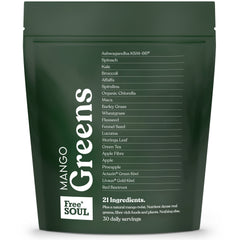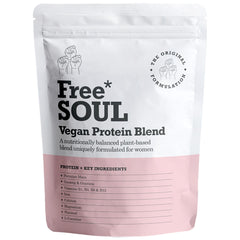Endometriosis and Diet: Foods to Eat and Avoid for Better Wellbeing

March marks a significant moment in our journey toward female wellness – it's Endometriosis Awareness Month. At Free Soul, we're proactive advocates for women's health and wellbeing, and we understand the challenges that come with living with endometriosis.
Our community is dedicated to spreading awareness and providing resources and support to women facing endometriosis. Registered Nutritional Therapist, Marilia Chamon shares her insights into the power of diet and nourishing the body to combat symptoms of Endometriosis, helping women lead a healthier, brighter future.
Living with Endometriosis
Living with endometriosis can be challenging, characterised by tissue similar to the lining of the uterus growing outside the uterine cavity, endometriosis affects roughly 1 in 10 women during their reproductive years. This condition can cause debilitating pain, heavy periods, and infertility, impacting women's physical, mental, and social wellbeing.
However, emerging evidence suggests that diet and lifestyle modifications can play a crucial role in managing symptoms and improving quality of life. This comprehensive guide, backed by scientific research, aims to empower women with endometriosis through innovative nutrition and dietary choices.
Understanding Endometriosis
Endometriosis occurs when endometrial-like tissue grows outside the uterus, commonly on the ovaries, fallopian tubes, and tissues lining the pelvis. This tissue behaves like the endometrium, thickening, breaking down, and bleeding with each menstrual cycle. However, trapped blood cannot exit the body, causing inflammation, pain, and the formation of scar tissue. Symptoms vary but often include pelvic pain, heavy menstrual bleeding, pain during intercourse, and infertility.
The Role of Diet and Lifestyle
Research indicates that diet and lifestyle factors can influence endometriosis symptoms. Certain foods may exacerbate inflammation and pain, while others might offer relief and reduce symptom severity. While no one-size-fits-all solution exists, understanding how different foods impact the body can guide dietary choices that support overall wellness and symptom management.
Foods to Eat
Omega-3 Fatty Acids:
Omega-3 fatty acids, found in fatty fish like salmon, mackerel, and sardines, as well as in flaxseeds and walnuts, have anti-inflammatory properties. Studies suggest that increasing omega-3 intake can help reduce the inflammation associated with endometriosis, potentially alleviating pain.
Fruits and Vegetables:
A diet rich in fruits and vegetables can offer a wide range of antioxidants and phytochemicals, which help combat oxidative stress and inflammation. Leafy greens, berries, and brightly coloured vegetables are particularly beneficial.
Whole Grains:
Whole grains, such as quinoa, brown rice, and oats, provide essential nutrients and fibre. Fibre helps regulate oestrogen levels by aiding in its excretion from the body, potentially mitigating some of the hormonal imbalances associated with endometriosis.
Anti-inflammatory Herbs and Spices:
Turmeric, ginger, and cinnamon possess natural anti-inflammatory compounds. Incorporating these spices into your diet may help reduce inflammation and pain symptoms.
Foods to Avoid
Ultra-Processed Foods:
Ultra-processed foods, which include fast foods, packaged snacks, and ready-to-eat meals, often contain additives, preservatives, and artificial ingredients that can promote inflammation and disrupt hormonal balance. Minimising intake of these foods in favour of whole, unprocessed options supports better health and symptom management.
Refined Sugars and Carbohydrates:
High intake of foods rich in refined sugars and carbohydrates can lead to insulin spikes and inflammation, exacerbating symptoms. Limiting items such as white bread, pastries, and sugary snacks is recommended.
Refined Oils:
Refined vegetable oils such rapeseed and corn oil are high in omega-6 fatty acids, which can contribute to inflammation when consumed in excess and not balanced with omega-3 fatty acids. These oils are commonly used in processed foods and fast food. Opting for healthier fats like olive oil, avocado oil, or coconut oil can help reduce inflammation and support overall well-being.
Endometriosis is a complex condition, but adopting a supportive, anti-inflammatory diet can play a significant role in managing symptoms and enhancing quality of life. By emphasising whole, nutrient-dense foods and minimising pro-inflammatory ones, women can take proactive steps towards better health and wellbeing. Remember, dietary changes should complement medical treatments advised by healthcare professionals. For personalised nutrition advice, consider consulting a nutritional therapist specialising in women's health










